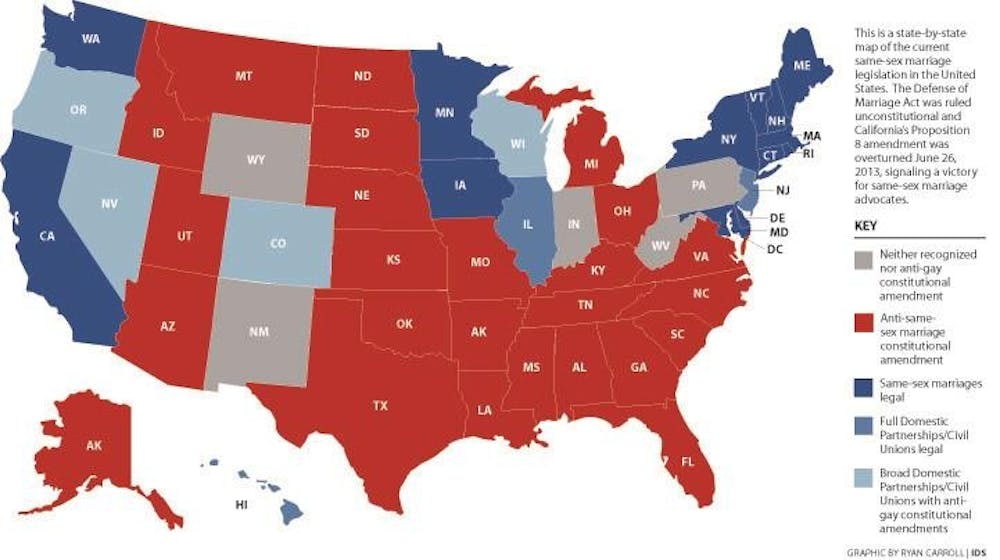Even though Indiana was not directly affected by The Supreme Court of the United State’s ruling to shoot down the Defense of Marriage Act and dismiss Proposition 8, it is still considered monumental and controversial.
On June 26, in a 5-4 ruling, the Supreme Court decided both were unconstitutional according to the U.S. government.
Indiana Governor Mike Pence issued a response disagreeing with the decisions in the two court cases, U.S. v. Windsor and Hollingsworth v. Perry.
“I believe marriage is the union between a man and a woman and is a unique institution worth defending in our state and nation,” Pence said in a press release. “For thousands of years, marriage has served as the glue that holds families and societies together and so it should ever be.”
While Pence expressed disappointment in the Supreme Court’s decision, others praised the court for their decisions to shoot down DOMA allowing same-sex couples to be recognized by the federal government as married.
Spc. Samantha McCartney and her partner Sgt. Jennifer Brown, both of the Army Reserves, were affected by DOMA and McCartney wrote a letter to Pence in response to his statement.
“Gov. Pence, your recent proclamation in support of a state constitutional amendment to exclude the LGBT community from receiving the same benefits as the heterosexual community is appalling and infuriating,” McCartney, an Indiana resident and a United States veteran, wrote in her letter. “Same-sex marriage does not negatively affect your family in any way. If it does, your family bonds are weak. DOMA impacted my family personally and financially.”
By the Supreme Court shooting down DOMA it allows same-sex couples to be eligible for more than 1,100 federal benefits, rights, protections and responsibilities in states where same-sex marriage is already legal.
These benefits are already afforded to legally married heterosexual couples.
Pence praised the Supreme Court for allowing each state the sovereignty to define and administer marriage as they see fit.
“Now that the Supreme Court has had its say on the federal government’s role in defining marriage, the people of Indiana should have their say about how marriage is understood and defined in our state,” Pence said in the press release.
Though the rulings did not impact the legal protections or recognition for same-sex couples in Indiana, the state will be able to vote in 2014 on House Joint Resolution 6, a proposal to change the Indiana Constitution.
“I look forward to supporting efforts by members of the Indiana General Assembly to place a constitutional amendment on the ballot for voter consideration next year,” Pence said.
If enacted, this would change the Indiana state constitution to include language that says marriage in Indiana shall only be valid or recognized between one man and one woman.
Through DOMA and the illegality of same-sex marriage in Indiana, McCartney and Brown were unable to use their benefits awarded to them by the U.S. Department of Veteran Affairs when they purchased their first home together.
These benefits usually decrease the interest of a home loan, forego primary mortgage insurance and do not require a down payment on the home.
“By using the VA loan, we could have saved approximately $30,000 over the life of the loan,” McCartney wrote.
For two non-married people to co-sign a home loan, both have to be VA loan
eligible.
Both McCartney and Brown are indeed eligible, but there is an extra review process for loans with two unmarried people on it.
“A lot of mortgage companies won’t touch VA loans with two unmarried people because the process can take a long time,” she said. “We decided not to use the VA loan because we had a problem finding a mortgage officer who would be willing to deal with the process that a VA loan takes with two unmarried people.”
There is also the inheritance tax to consider.
McCartney said both her and Brown’s names are on a conventional loan for protection because the inheritance tax rate is approximately double for non-married couples.
McCartney wrote in her letter that it is a slap in the face, as veterans, that her and her partner were unable to simultaneously use the benefits and have both of their names on the loan.
She ended her letter by reassuring Gov. Pence his family is protected, but her own is still being discriminated against.
“Marriage equality will not destroy families,” she wrote. “Instead, it will include all families. While you have the comfort of knowing that your family is protected, the LGBT community and its allies will have to fight every step of the way. The denigration of the LGBT community has to stop.”
In Pence’s statement, he said he is confident Hoosiers will reaffirm their commitment to traditional marriage and will consider this important question with civility and respect for the values and dignity of all of the people of Indiana.
McCartney disagreed, signing her letter, “A Marginalized Lesbian Veteran Hoosier, Samantha McCartney.”
DOMA ruling receives opposing responses in Indiana

Get stories like this in your inbox
Subscribe





